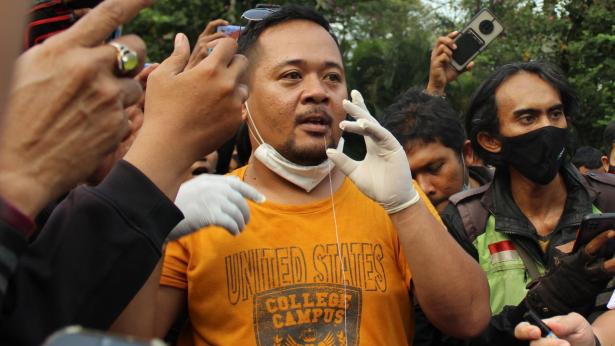Blood ran down from Wely’s mouth as he pierced a sewing needle through his lower lip. Wely was one of five on-demand gig drivers who work for apps like Gojek, Grab, and Shopee, who planned to sew his lips shut this week to protest stagnating wages and poor working conditions.
But before Wely could continue, a man in a bright yellow shirt approached.
Budi Setiyadi, the former director general of land transportation, had been sent down to the event by the Ministry of Transportation. He immediately addressed Wely and the other workers.
“Driver fees will soon be increased,” Setiyadi told the protesters. “I can tell you it will be in one or two weeks.” The protest ended there, but not before the delivery drivers yelled angrily, reminding Setiyadi of the government’s past empty promises.
The lip sewing, meant to symbolize the difficulty drivers have experienced in getting the attention of regulators, is by far the most extreme act of protest by gig economy drivers in Indonesia to date.
Domestic and international super apps operating in Indonesia, Southeast Asia’s largest nation, are facing an increasingly militant labor movement. Desperation is growing among many gig workers, fueled by creeping inflation and the seemingly endless pandemic.
“We want to hold the government accountable their own regulation,” Mahmud, chairman of the gig work drivers’ association coordinating the action, told Rest of World. “We are tired of continuously demonstrating and sending letters to the ministry.”
Mahmud was referring to a series of ministerial regulations that promised delivery driver fees would be reevaluated every 6 to 12 months. In addition, the regulation called for protection of drivers despite their contractor status — which many deemed as one-sided and exploitative. Protestors say neither promises have been kept, and are also demanding that the government repeal a job creation bill viewed as detrimental to gig workers’ rights.
“A lot of us have been coming home to flying plates [thrown by our partners] for failing to bring enough money,” said Sunardi, a protester and coordinator of the event. “We want a change today.”
Indonesia’s June inflation rate stood at 4.35%, which is the highest in five years and exceeded the central bank’s target range of 2 to 4%. Prices for some staple goods, including cooking oil and red chilis, have risen, hitting lower-income households.
Rest of World previously reported that drivers’ incomes had dropped by nearly 70% during the pandemic, sparking often-spontaneous local strikes among gig workers in Indonesia for the past two years. With the economic downturn this year, protests are becoming more frequent.
Former Director General of Land Transportation, Budi Setiyadi, had been sent to the protest scene by the Transportation Ministry
Arif Novianto, a researcher at the Institute of Governance and Public Affairs at Gadjah Mada University, told Rest of World that he estimated there were twice the number of protests between January to March 2022 as there were between 2020 to 2021. There have even been talks about nationwide strikes this year in an effort to unite as many of the fragmented drivers’ associations for gig work as possible.
“The trend of gig workers’ protests is rising, and will rise even more if the government increases the price of non-subsidized gas,” Novianto said. “Groups are beginning to strategize online about how to create a more united movement.”
At the same time, last year GoTo lowered incentives and fees for GoFood drivers, prompting many to take to social media to complain. Competitor platforms Grab and Sea Group have also reduced incentives and cut staff as tech companies shift focus toward profitability, a July 2022 Morgan Stanley report showed.
Setiyadi, the former ministry official, told protesters that the government was promising to raise the minimum driver fees by August 12. Drivers participating in Wednesday’s protest told Rest of World that they were cautiously optimistic the government would stick to its word this time.
The fee increase will likely drive up costs for tech companies, which are already struggling to attract investors as appetite for cash-burning firms wane in the current macro backdrop. “Some investment jitters will materialize on the back of potentially increased cost pressures ahead,” said investment firm Samuel International managing director Harry Su, commenting on the protest. GoTo’s share price has dipped roughly 20% since the beginning of the year, while its rivals Grab and Sea Group’s stocks have fallen at least 60%.
Wely, the protester, said at the end of the day that he was still a little skeptical of whether the regulatory changes will come through. “If the fees still don’t increase, I’m going to burn myself,” he said, laughing, before walking away from the event.


Spread the word